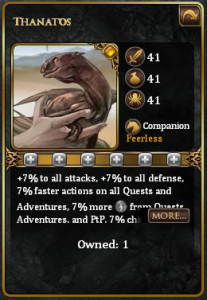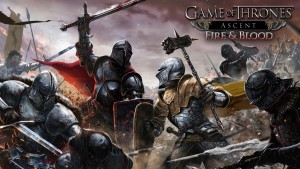Telltale’s Game of Thrones series has been getting a lot of attention as an epic video game companion to the most popular fantasy television show in history, and rightfully so (members of our team at Sub-cultured have been streaming the game as a featured treat in our Game of Thrones Month content). But a franchise that is so widely watched and beloved indicates a diverse fan base who can consume and engage with all different kinds of content. We’ve been impressed with Disruptor Beam’s social media game, Game of Thrones Ascent, which serves a different kind of gamer and fan who are less attached to the rich characters and political intrigue of A Song Of Ice and Fire, but still want to role play in the world of Westeros with friends. The game, with a platform integrated with Facebook and with apps on iOS and Android, launched two new expansions this week almost two years after its debut. The Tales of Ice and Fire and Fire and Blood expansions prove that the developers behind the Game of Thrones Ascent have been eager to listen to player feedback and criticism to produce new content and a system that will cure the fatigue and boredom experienced by longtime players as well as attract new social gamers.
The Fire and Blood expansion adds a new building, the Dragon Pit, to the holdfast of all players where quickened dragon eggs can be hatched without the need to reincarnate their characters to collect all of the fealty houses. This building will also allow those lucky and dedicated enough to own a baby dragon to mature their beastling into anyoung (probably ornery) teen dragon. The route for hatching an egg will take much more time and luck to complete than through the reincarnation path as crafting the necessary ingredients will take a significantly more loot. But, as we learned from Star Wars Galaxies, the most rare and highly powered rewards should demand more effort, time and dedication.
For two years, players who have wanted to acquire, quicken and hatch their very own dragon (the most powerful item in all around base-stats in the game) would have to commit to several rounds of reincarnations – a system in which players would need to abandon their previous characters as well as all of their loot, silver, and level progress to start the entire game over while swearing to a different fealty house with a different skill and building specialty. So, in order to get a dragon, you’d have to be willing to play severely de-powered for a minimum of months of intense and committed playtime. Most gamers were less critical of the time commitment than they were of the necessity to change fealties. Fans of the books or show will know that there is a huge difference between Team Stark and Team Lannister, and having to replay a significant portion of the game as a different bannerman of each of the seven in-game major houses was a real deterrent to most gamers and fans, even though the overall game play was altered very little between fealty choices.
Prior to the Fire and Blood expansion, if you weren’t willing to sacrifice your honor and loyalty to your chosen house, there was not much to offer many players that had surpassed a certain point in the game. And even if you were ready to hatch your dragon, there would be little to do beyond sending your sworn swords on near endless routine farming adventures to collect all the necessary items. New quest lines for the most part coincide with seasons of the show, which means many players would find themselves all caught up with months before new content quests were released. Team-oriented players can participate in Alliance combat, which is a neat feature that allows players to participate in full-blown war during AvA phases. Again, many were left with little to do during peace time beyond recovering from the carnage of an AVA phase – replacing or burying your dead sworn swords, replenishing your silver and restocking your basic resources for the next identical go around.
The new Tales expansion is best described as a great addition to a game that will provide players with what they’ve been clamoring for: more to do! Tales of Ice and Fire can be read about here, where the developers have not only explained how the system works in detail, but also why they chose each new feature. This was a nice change for a game that has been criticized as having a poor learning curve for new players who have to rely upon player-generated wiki (not that we’re knocking that wiki, it’s superb).
Tales incorporates some of the most fun aspects of the game: opportunities for great one-time-only loot (some of it great, some of it sort of useless), play-to-player competition, fast paced tactic and chance-based success, and challenges for your best sworn swords. Our criticisms are that it takes a little too long to regenerate enough “vigor” to send out your sworn swords again compared to how long each attempt lasts (over three hours to replenish compared to maybe 10 minutes of play if we’re being generous). You can shorten the time to replenish your vigor as well as swing the odds in your favor for winning if you’re willing to spend a significant amount of gold (thats equates to real life cash, folks.) This is true with a lot of aspects of the Game of Thrones Ascent, however the majority of the Tales system is based on luck and there is an added pressure of losing all the threshold rewards you earn should you chose not continue on and not bail out early and fail later in the challenge. Also, success makes each subsequent attempt harder, but each challenge gives you the opportunity to spend gold ( again, that’s in-game premium currency) to reattempt or wipe away “debuffs” that hurt your odds. The system seems to rely too much on gambling with your real life money in order for a player to do very well. But, the developers need to be paid to live in the real world so shrug. Bottom line and JMO – Tales, while fun, is the most play-to-win addition to the game that we’ve seen and may (and should) put off a lot of players.
The team responsible for Game of Thrones Ascent has always been aware that what makes their product special is in it’s ability to function seamlessly as a social media platform as well as role playing game. The team manages their own forums and pushes weekly builds to improve player experiences, address known bugs and issues, and announce upcoming changes and progress. The crew clearly takes time to interact with their players with friendly blog posts and frequent gifts of items, gold, and boosts to production time, which helps even out the divide between players who play for free and those who will fork over real life cash for virtual currency and items. Their dedication to creating a fun game that people enjoy pays off in both of these expansions and no doubt players can expect that their praises and criticisms will be noted and addressed in tangible improvements in the weeks to come, including starting a new AvA phase that was stalled by the expansion launch.
Kaitlyn D
Senior Staff Correspondent
@Deadrabbit92
(Dragonglass Citadel Alliance)
















